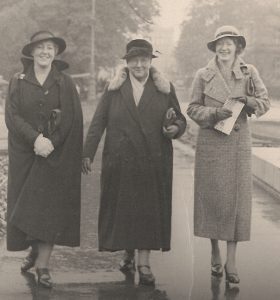
Selina Cooper (centre), Women Against War and Fascism delegation to Munich, Oct 1934
Courtesy of Lancashire Archives, Archive ref: DDX1137 5/120
Selina Cooper worked full time from age 13, joining the Nelson branch of the Cotton Workers Union and in 1891 leading a dispute over the lack of decent toilet facilities for women weavers. She attended education classes at the local Women’s Co-operative Guild and was involved in the local Independent Labour Party (ILP). In 1900 she joined the North of England Society for Women’s Suffrage, helping to organise a petition that was signed by women working in the Lancashire cotton mills and was chosen as one of the delegates to present it to the House of Commons. In 1901 Selina stood successfully as an ILP candidate in the Poor Law Guardian elections. In 1910 she was chosen as one of four women to present the case for women’s suffrage to Herbert Asquith, the Prime Minister. In 1911 she became a national organiser for National Union of Women’s Suffrage Societies.
During World War 1 Selina was a pacifist, totally opposed to military conscription. After its introduction in 1916 she helped men who were sent to prison for refusing to fight. In 1917 she organised a huge Women’s Peace Crusade procession in Nelson. After the war Selina continued to be actively involved in local, national and international politics, joining the committee of the Nelson branch of the League of Nations Union and the local No More War Movement. She organised the Nelson contingent of the Peacemakers’ Pilgrimage in 1926 and was part of a Women Against War and Fascism delegation to Germany in 1934.
References/Further Reading:
J. Liddington, 1984. The Life and Times of a Respectable Rebel: Selina Cooper (1864-1946). London: Virago Press.

